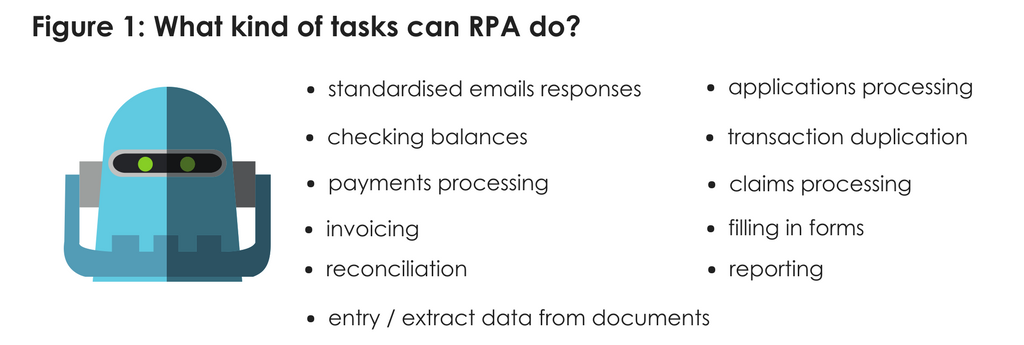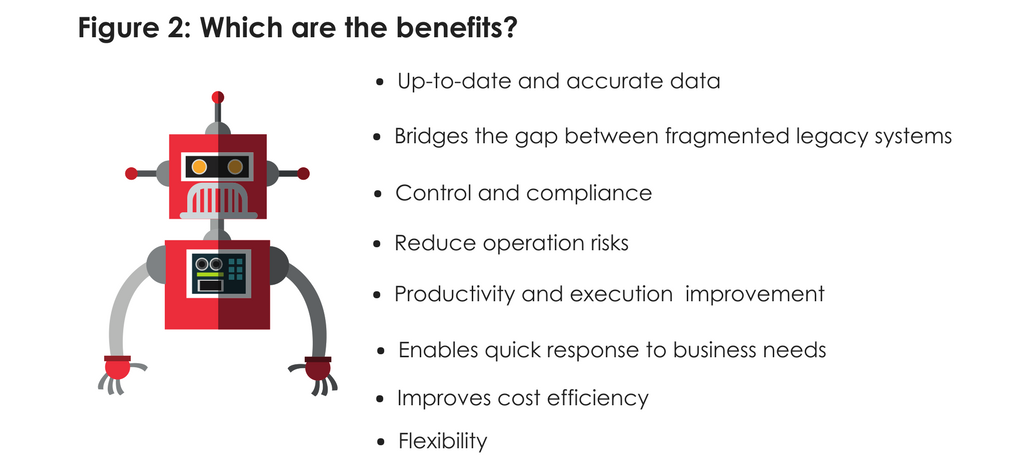The benefits of implementing Robotic Process Automation in the Leasing and Financial services industry has caught the attention of many CFO leading the digital transformation strategies in their organisation. Financial service institutions around the world are responding to the evolving market demands by adopting smart technologies like RPA, to align the front, middle and back office operations to improve customer experiences.
The 2017’s McKinsey Global Institute report forecasts that 30 percent of the activities in about 60 percent of all occupations can be automated, and in particular in the Finance and Insurance sector, with a 43 percent automation potential. According to Gartner, the robotic process automation software market will grow by 41% year over year to 2020. However, financial institutions are only beginning to scratch the surface with these smart processing technologies and CFO still struggle to realise its promises fully, and much of the technology potential remains untapped.
What is Robotic Process Automation (RPA)
RPA is one of the technologies sitting under the umbrella of Intelligent Process Automation (IPA). It is a solution designed to replicate human actions to complete a task or a series of tasks. It is typically used for repetitive tasks and mostly performing simple work, with low judgment and high-error-prone. In the finance function, these functions would translate into data entry, invoice queries, standardise emails responses, reconcile general ledger account, checking balance (figure 1). A solution that does not demand a major IT transformation with complex integrations, and it can be applied to existing applications without having to change the current legacy environment. 
Many are the benefits of implementing RPA in the finance function, beside efficiency and the substantial time and money savings (figure 2). Companies can redirect human resources to more value adding tasks that require judgment and combined with other digital and machine learning technologies can deliver greater value.

The Importance of Business Process Management (BPM) in a RPA Implementation Strategy
The increasingly high customer expectations, call for innovation in the finance function. Most CFOs are aware of the benefits of automating a simple rule-based process to fix problems like the errors associated with manual data entry. However, most businesses struggle when moving to automation because they lack a robust and optimised business processes base. RPA will automate a process as it is, so all existing inefficiencies will be mimic, limiting the potential benefits of the solution.
These innovations, need a robust process analysis in place, a complete assessment of the critical finance processes. A top to bottom evaluation, rethinking processes to enable the innovation that the market demands. A clear business process documentation will help to manage this change, not only during the assessment and the implementation phases but in the full cycle. The dependence between systems, applications, data and business strategy requires a full visibility and control of the impact that any change in a process or company’s strategy can have.
Other important considerations for a successful implementation:
Define a process automation strategy for your pilot test that integrates a BPM approach
RPA can become a broader strategic tool beside the tactical cost savings from automation, and the opportunities are substantial. Identify the most appropriate processes for RPA by looking for rules based parts of business processes. Develop an initial roadmap with a strategic approach challenging teams to reimagine and redesign processes and organisational structures around current processes, prioritising areas that will provide ROI, and that would have the biggest impact on the customer experiences.
Integrate your IT department from the outset
Financial service institutions’ core systems and processes were not designed with robotics in mind. While a modification in a security process, can be quickly handled with a human operating, a robot may need significant reconfiguration to manage the change.
Change Management
Like any other transformation program, RPA requires a robust communications plan to help manage the implementation, automation adoption and align the organisation culture with the business strategy.
VIP Apps Consulting combines experience in the finance function and comprehensive knowledge of technology innovation, we help our clients in the leasing and financial services industry to identify those areas of improvement in their digital transformation journey






